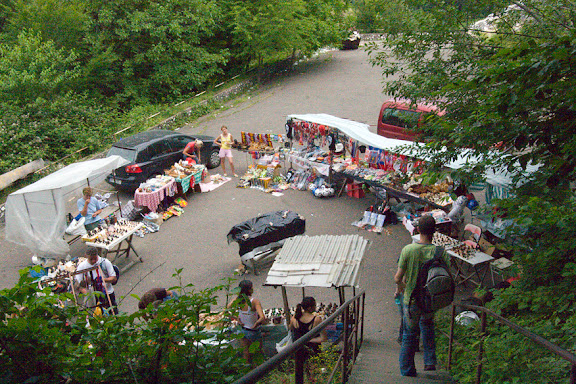 My mom's craving for sweets started early in her life, the chestnut episode being one of the frequently told tales in our family. Chestnut puree is a well known Hungarian dessert, served with lots of whipped cream. She prepared it during a cooking class in school, but there was no time to eat what she'd prepared, as usual, so in her fear to miss the feast, she filled both pockets of her white apron with the brownish pleasure, the large stubborn staines becoming the silent memorial of the episode.
My mom's craving for sweets started early in her life, the chestnut episode being one of the frequently told tales in our family. Chestnut puree is a well known Hungarian dessert, served with lots of whipped cream. She prepared it during a cooking class in school, but there was no time to eat what she'd prepared, as usual, so in her fear to miss the feast, she filled both pockets of her white apron with the brownish pleasure, the large stubborn staines becoming the silent memorial of the episode.In communist Romania, food was scarce and one just eat whatever could be found in the stores and markets. Meat was missing, but not on our table, thanks to the weekly kosher meat supply to the members of the Jewish community. In my own cooking, I preserved my grandmothers' traditional dishes, with the carb- and fat-rich ones slowly being exiled into disgrace.
About a week ago I got an offer from Weight Watchers, their group conveniantly located at my workplace. What could be more tempting than something that does not require moving my car out of the underground parking, driving into sweatty Tel Aviv and haunting for a parking place or paying a small fortune for one? To my surprise, Peter, my husband thought it's a good idea and so I decided to try, the worst scenario being that the 4 extra kilograms stubbornly clinging to my stomach will refuse to leave.
Armed with my credit card and lots of motivation, I pass the first weighting, listen to the boring opening lecture and leave with a new type of ammunition: the points system. I have to write down everything I eat and drink and fit it all into 20 daily points. The first crisis hits me soon enough, just after dinner. How am I supposed to point a few bites of this or that? What about all the food types missing from the list I got? I seek long time weight watcher's advice, but no relief comes. "You have to estimate" they tell me. Their local website, just like the booklet I got, is not helpful at all. Most of it is marketing material filled with lots of 'before' and 'after' stories and pictures of people wearing smiles and new outfits. Power to them.
I wonder wether the frustrating point counting system is supposed to take my appetite away. Second and third day I'm over budget. I find myself constantly thinking about food, hunger, points, still not capable of refusing a slice of cake left in the office kitchenette and feeling guilty during and after cosuming it. Psychosomatically (or is this my pre-diabetes?), my stomach feels bloated when eating forbidden food, punishing me for hours and days.
Still, I can't bear the the thought of eating anything with the words 'diet' or 'light' label on the package. I'd rather eat less of the real stuff. Huge powers prevent me from resting my fork at the first sign of satiation.
The first few days I just register and summarize what I've eaten, but now I'm also trying to choose food types with less points. I find this easier to implement when eating just after the first sign of hunger. Will I succeed to move the next step?
For now, the keywords for success seem to be awareness and perseverence.











